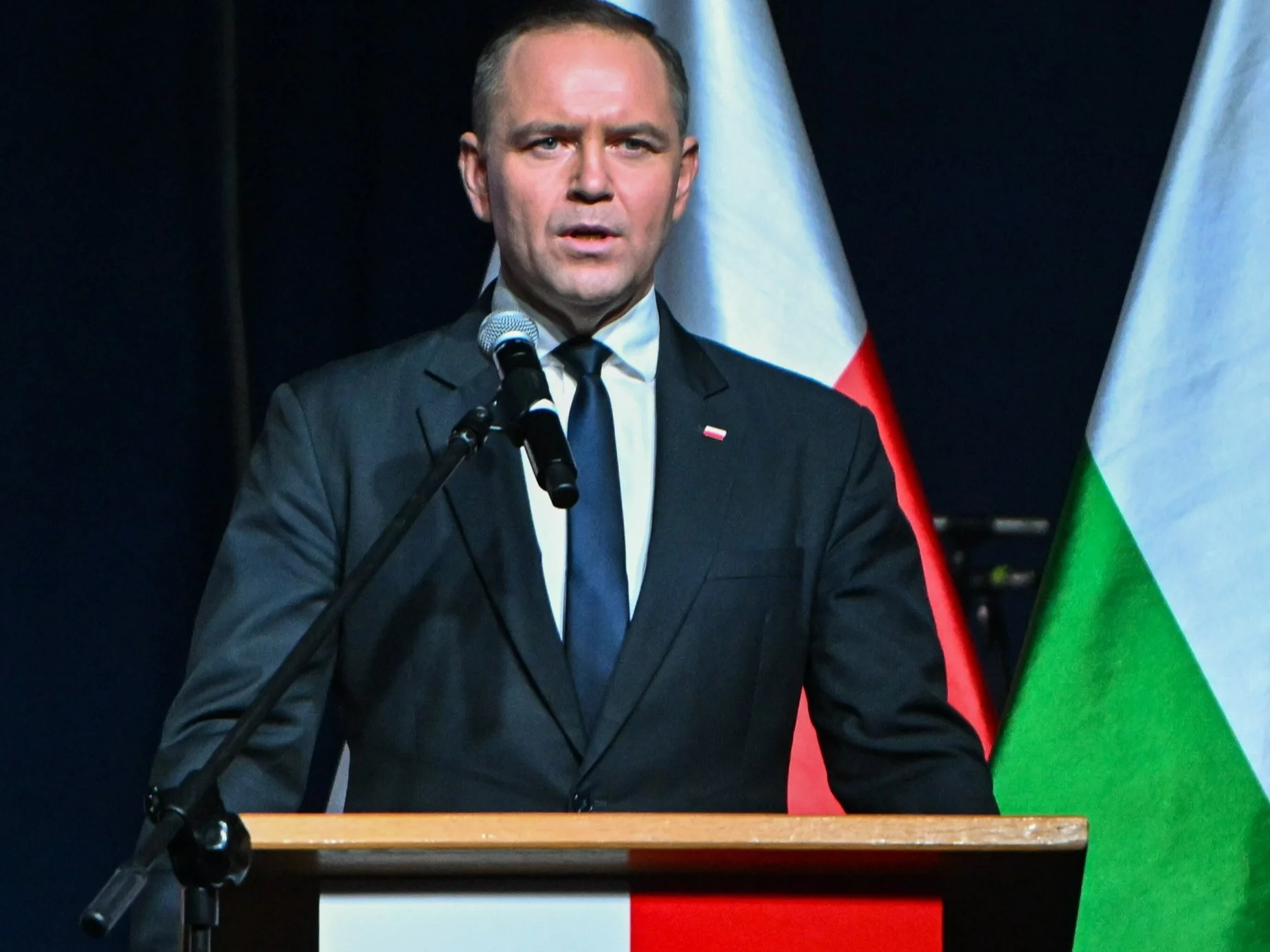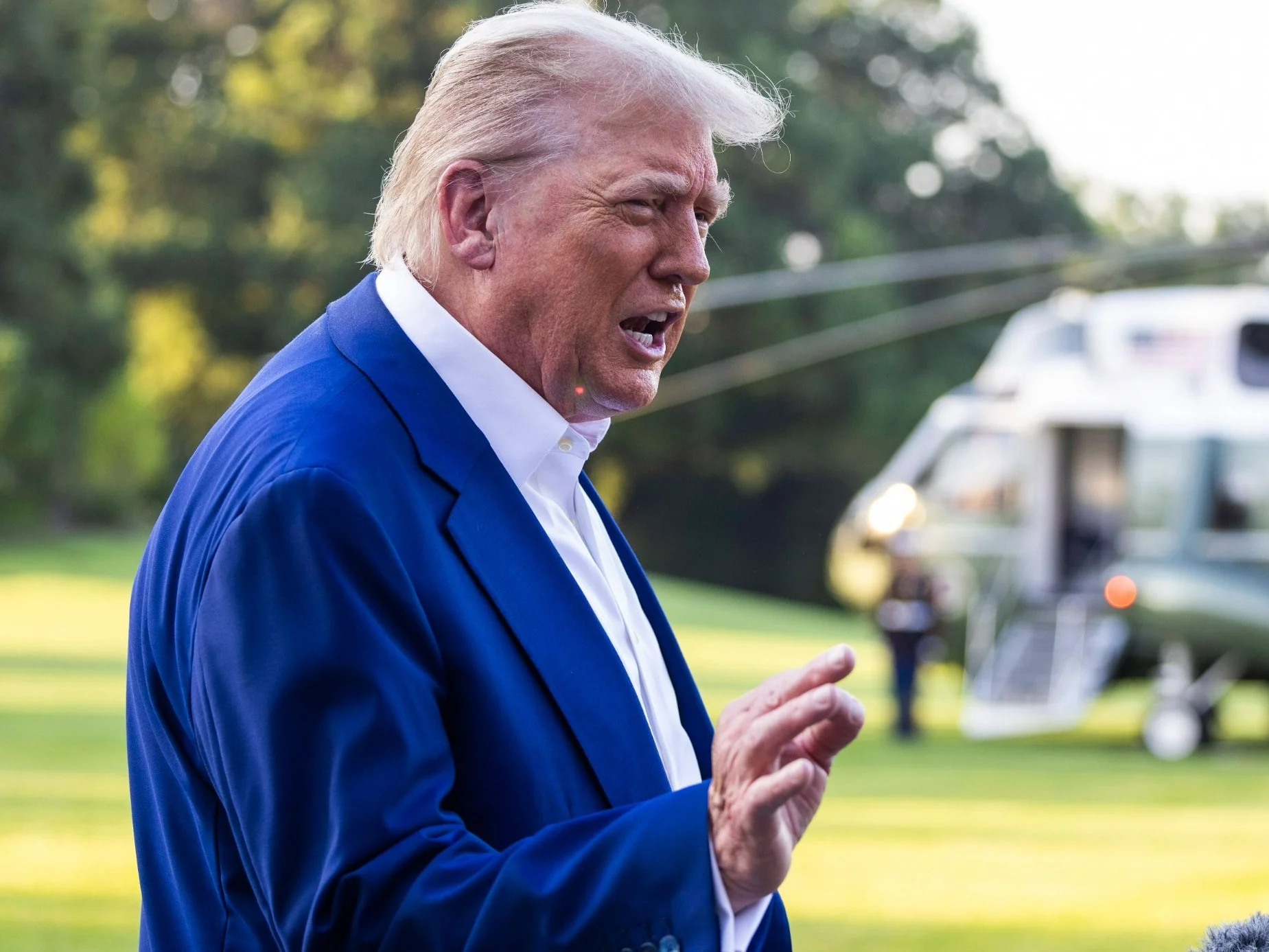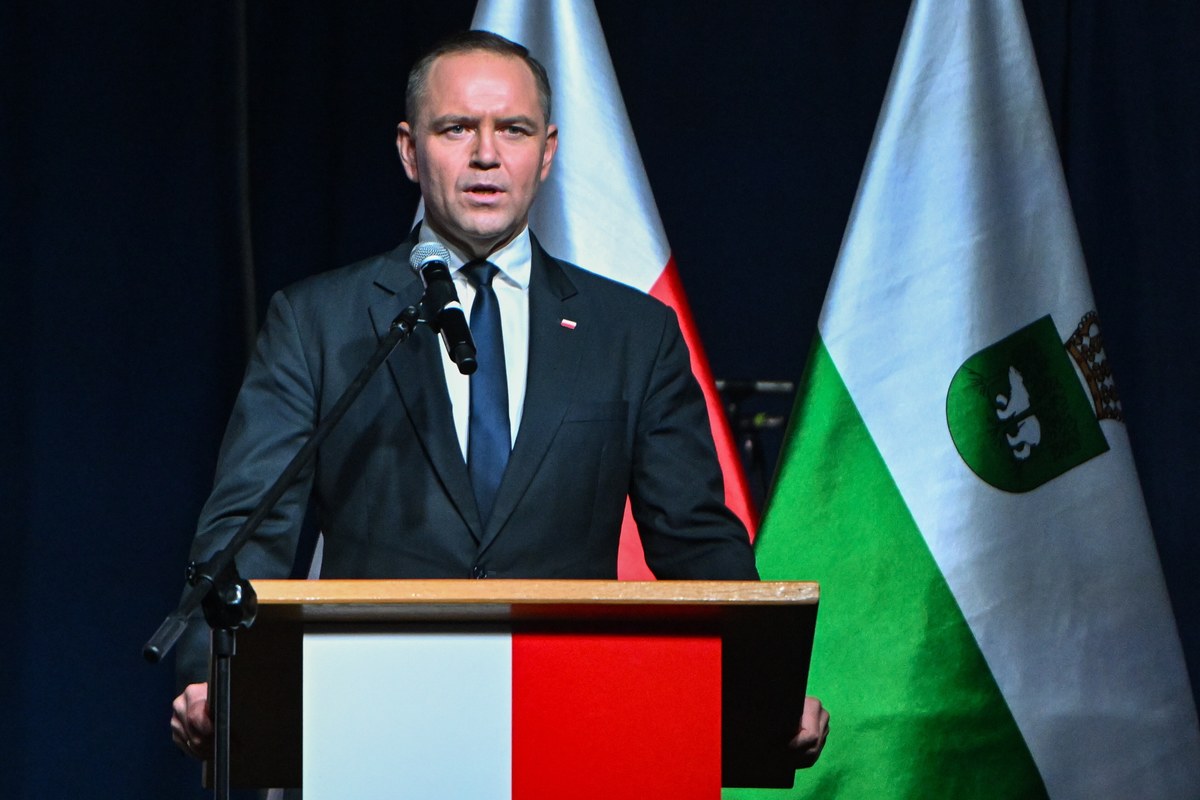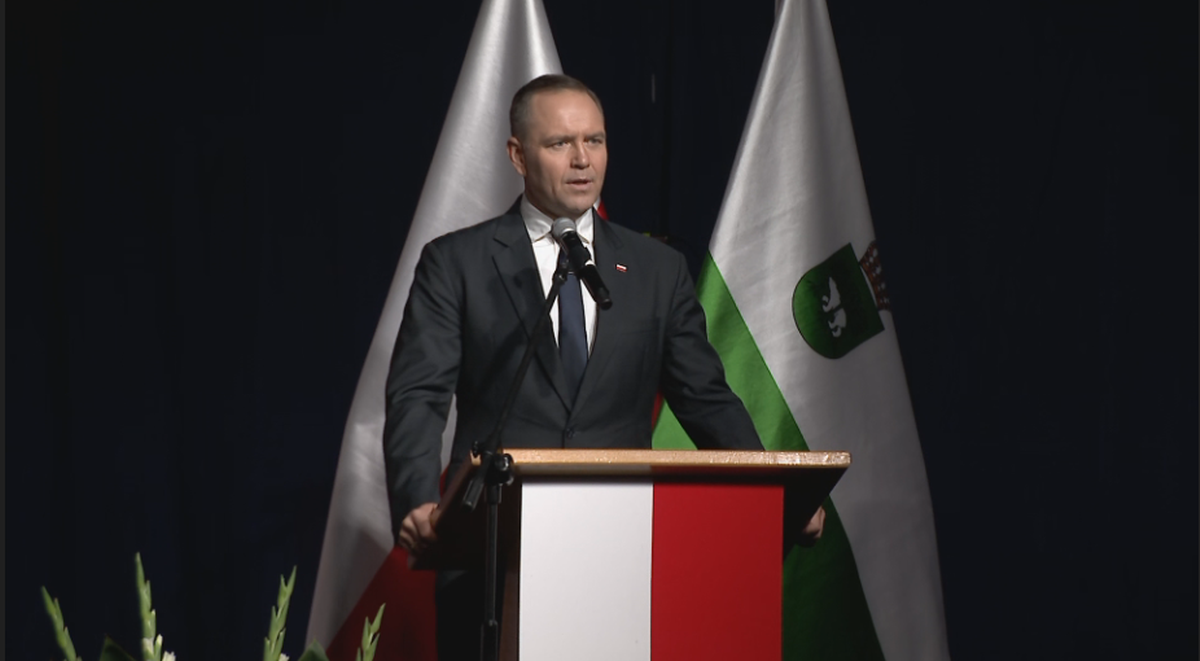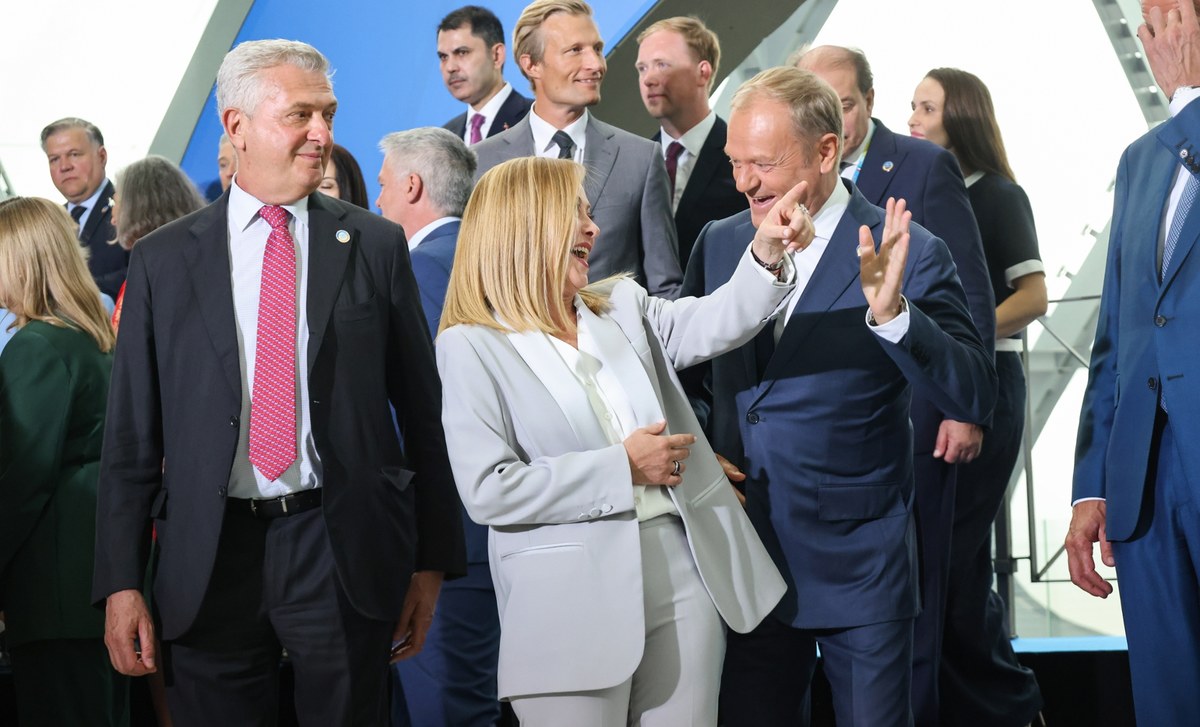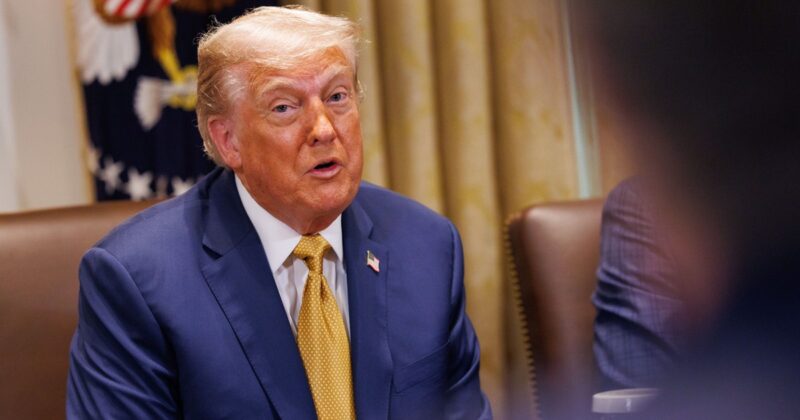
At the minute erstwhile the Slovak Prime Minister Robert Fico fought for his life, shot respective times by assassin Juraj Cintula, a comment by Ziemowit Szczerek appeared on the Onet portal. He wrote: “However, it should be remembered that criticism of the actions of Prime Minister Fica, including the harsh and maintained in an alarming tone, is not unreasonable [...] So, of course, political force and those calling for it must be condemned. But we must besides remember the specificity of Slovak politics. Especially as members of Smeru are already trying to gamble political capital on the Prime Minister's shooting and make anti-opposition hysteria without peculiar resistance. Under whose cover they will most likely proceed to dismantle the Slovak regulation of law."
She co-wrote him on this portal Weronika Gogola, the author of a tandem-liberal book about Slovakia (I had an chance to review it Here.): “The accusations have already been made against the opposition and journalists critical of the government. Hatred of the media and journalists has late reached an apogee. It'll be another turn against them. The acquisition of radio and tv continues – all these are classical steps towards totalitarianism". Apart from the misunderstanding and hysteric abuse of basic political concepts typical of the author, she had a alternatively circumstantial reflection: “There is simply a war in Ukraine. If Russia wins it – and without the aid of the West it will happen – Slovakia will become a totalitarian, pro-Russian and Kremlin-controlled state."
In his Facebook comment, Darius Zaleg added little known than the others, from the state of possession of the restaurant owner, from the phrases left, close to Political Critics: “I am an opponent of individual panic due to the fact that it is counterproductive (unless I immediately detach Hitler or Putin). However, I would like to remind you that those who now mourn over Fico someway did not cry over Slovak journalists murdered by people from his circles. someway it happens that the mafia and the proputinists hold well” (original spelling).
There's a lot more votes like that. However, the quoted exhaust the ingenuity of the Polish liberal and service environment towards the left in Slovakia and the assessment of the situation there. And besides in terms of their moral level: although Fico almost died at the hands of a bandit and struggles for his life, he actually "earned it" due to the fact that he supposedly co-murdered journalists, dismantled the regulation of law, and did totalitarianism.
Who and why fired
According to the Slovak Liberal paper ‘SME’, ‘[s]the lawman was actively active in political matters, the origin of the attack was his political opposition to the cessation of military aid to Ukraine, changes in public tv and justice’. The survey of the Center for east Studies states: “In the video recorded after the detention, he says that “he does not agree with the policy of the government” and mentions in peculiar attacks on the media. [...] a photograph from social media from February this year shows it in anti-government protests against changes in criminal law and the liquidation of the peculiar prosecutor's office".
Cintula is simply a literate from the city of Levíce, associated with liberal-democratic circles, engaged in protests against current power. It is no wonder that the Slovak liberals' environment was filled with panic. Progress, democracy, tolerance and Europe had on their lips, and brauning in their pocket, paraphrasing Tuwim's celebrated poem about the assassination of president Narutovich.
It was so attempted to launch a propaganda communicative on the bomber's links to a tiny right-wing and pro-Russian paramilitary group Slovenskí Branci (S3učovcy Pobor), dissolved in 2022. The evidence of these connections is mainly a photograph on which Cintula stands in 2016 alongside members of the organization. Exhibitor SP, Peter Švrček, informed the media that he had given evidence to the police regarding contact with Cintula. It was to appear in Trnava during the collection by this organization of flowers under the monument of Anton Bernolák, a Slovak codifiedator. He read a poem that Švrček does not remember. another sources say that the pronunciation of the poem criticized the usage of violence. Švrček claims that Cintula was not a associate of the organization, expressed general compliance with part of its goals and attitudes (this is confirmed by his erstwhile entries on the FB), but criticized the paramilitary character of the formation. Shortly after his informal relations with the Slovak conscripts, he set up a marginal initiative called the Movement Against Violence. That was 8 years ago. Since then, Cintula has been radicalized, and the relation between the future bomber and the "anti-popular" environments has become increasingly clear.
The transmission of the Pro-Russian inspirations of Cintula does not make any sense, of course, in the face of the opinions that against Fica rise the allegation that it is pro-Russian. If Fico had specified views, and Cintula had serious complications of this type, the second should alternatively hide the erstwhile from someone's own breast shots than want to kill him. Just 3 weeks before the bombing, on 24 April, his perpetrator attended a rally in the village of Dolná Krupá – together with a group of demonstrators he shouted “Long live Ukraine”, “Out with Fica” and “Traitors” to the members of the government leaving the distant cabinet meeting. This is documented by liberal Slovak media. On February 7, the bomber took part in a large demonstration of liberal environments against changes in the legal system.
More crucial than the bandit itself, however, is the foundation of banditism.
Rulers of the country
Cintuli does not like the reforms undertaken or announced by the Fica government. Among them, an effort to recover public media from liberal environments and limit their narrative. In a country where almost the full media sector is in the hands of specified circles. Similarly, it is with "civil society" and "public opinion leaders".
These circles, called ironically the Bratislava café, are almost a monolith of the worldview, formed in a liberal-progress spirit, with small, much smaller ones than in Poland, for example, the phrases left-wing. Completely mimicking the liberal mainstream in the West and mostly maintained by abroad foundations and wealthy home comets. All of this in a tiny country, where specified environments are not only fewer and elite, but besides devoid of living-profit alternatives at the level to which they are accustomed. fresh years have shown that they are increasingly losing on political grounds.
Criticism formulated in these circles towards populists has been going on for a long time, but in fresh years it has reached a immense scale and intensity. Of course, populists besides usage violent language and strong comparisons. But erstwhile Polish liberal commentators say that there is simply a brutalization of public debate there, they do not mention that in this war on the Liberal side there are almost all major media, leaders of public opinion, large and rich players of "civil society" etc.
 Information on cyclic anti-Smer rallies in Nitra
Information on cyclic anti-Smer rallies in NitraWith specified an arsenal, they can besides number on social support: assemblies, stickers, inscriptions, flyers, and posters. Their content and form do not avoid either abusive language or murmuring theories. Starting with the notorious word Smeru mafia, and ending with Pellegrini's references with homophobic threads (a politician has no partner and declares no desire to start a family) or xenophobic (because of partially Italian roots he is denied "true Slovakness").
 Discourses on homosexual alleged lovers of Pellegrini, Banská Štiavnica
Discourses on homosexual alleged lovers of Pellegrini, Banská Štiavnica "Pellegrini pedal fuj" — inscription in the village of Nowe Zamki
"Pellegrini pedal fuj" — inscription in the village of Nowe ZamkiWhat do they say about them?
Let us deal with the 3 most common charges against populists.
The first, loudest, is the execution of a writer mentioned in Zalega's quoted statement. In late February 2018, Ján Kuciak, an investigative journalist, and his fiancée Martin Kušnírová, were murdered in their home. Kuciak pursued and described the links of the planet of politics and business, corruption, financial scandals. In this, with the participation of the populists who then ruled the country. The execution shook Slovakia, sparked mass protests and led to political change. Prime Minister Fico resigned 3 weeks after the crime. He remained the leader of Smeru, who finished second in the 2020 election. The populists sat in opposition benches, and governments held a broad coalition of liberal groups of all shades.
This coalition had full power as the presidential office held Zuzana Čaputová, formerly associated with the liberal and antipopulist group Progressívne Slovensko since spring 2019. The execution trial was under full control of liberal environments. In addition, after the 2020 verdict, it was repeated and yet settled in 2023. In the meantime, all high-level decision-makers and police were listed, a number of investigations into the murders were repeated, fresh information was obtained. The trial convicted the killer and his principal. The crucial links between perpetrators and the Smer environment, and even more so with its leader and another key formation policies, have not been demonstrated. Even a murmured businessman, Marian Kočner, was acquitted for deficiency of evidence, who was suspected of having been ordered to murder. Even if we had accepted the hypothesis that Kočner was seriously active in the case, the inactive simple decency and respect of the legal culture of our civilization would have ordered in specified a situation not to wave accusations at Fica and his close associates for specified an act as complicity in the commissioned execution or even having cognition of planning this crime. At least until possible fresh facts and evidence arise. Liberals and their allies do not have specified subtleties. Even at the time of Fica's assassination.
So possibly Fico is at least pro-Russian, as liberal media say? The answer to this question is tempting. Here, the catalogued another “unuca”, we are morally better than she, fucked off. But it's more complicated. Fico is surely not the leading pro-Western and pro-European. Slovak populists are close to the social sentiments of those groups whose support brought them to power.
There is besides a clear reluctance in Slovakia towards active participation in the Russian-Ukrainian conflict, especially in the issue of armed aid. In the summertime of 2023, more than half of the respondents to the survey commissioned by the Liberal letter "SME" were opposed to continuing free military support for Ukraine. "The [government] support policy of Ukraine contrasts importantly with the attitudes of Slovak society. According to an Ipsos survey of March this year, 60% of Slovaks opposed the transfer of fighters. According to Eurostat's autumn survey, little than half of the population (47%) in turn approved EU humanitarian, financial and military aid for Ukraine as well as sanctions imposed on Russia.
This attitude distinguishes Slovakia in the EU, as the lower score was only in Greece. The Slovaks as the only society of the Visegrad Group countries are mostly negatively perceived by refugees from Ukraine, and 68% want to reduce aid for them," they wrote in September 2023, inactive under Liberal rule, Łukasz Ogrodnik and Tomasz Żornaczuk in the "Biuletyn of the Polish Institute of global Affairs". Among these attitudes are not so much pro-Russian sympathies but concerns of the inhabitants of a tiny and young country facing its future and the consequences of war. This can be ignored, and it can be taken into account in democratic politics and in representing large groups of voters, as I am writing from the position of definitely anti-Russian.
Fico has been pursuing a policy that has been hard to take as a pro-Russian during current governments since October 2023. Free military assistance was suspended, in line with the moods of the voters and pre-election promises, but "On January 24, Slovakia's Prime Minister Robert Fico met in border Uzhhoroda (the Zakarpackie circuit) with his Ukrainian counterpart Denys Shmyhal. [...] During the meeting, Fico announced the provision of humanitarian aid to Ukraine worth about EUR 220 000 and the transfer of Bożena mine trawls, and announced the transportation of 8 utilized ambulances. [...] Fico pursues a two-track policy towards Kiev – despite the usage of reluctant rhetoric Ukraine supports its east neighbour on many crucial issues, which distinguishes him from Hungary's attitude. The Slovak Prime Minister announced a vote in favour of the EU instrument Ukraine Facility, which will be decided at the European Council on 1 February, and reiterated the clear support for Kiev's EU aspirations. He had already confirmed the continuation of commercial military equipment supply contracts for the Ukrainian army, a large part of which are carried out by state-owned companies (holding DMD). Fico besides shows openness to providing further humanitarian and civilian assistance to Ukraine and the implementation of bilaterally beneficial projects," wrote Krzysztof Dębiec from the Centre for east Studies.
Just before the assassination of Prime Minister Fica, it was decided at a government gathering to build another atomic power plant. “From a political point of view, we cannot imagine that the technology for the construction of the power plant would come from the Russian Federation,” said Media Minister Denisa Saková, formerly Smeru activist, presently part of the coalition group Hlas.
Maybe at least corruption in the Smer case is simply a fact? I am far from being vouched for the crystal integrity of the activists of this group, and for actions contrary to law were convicted by its activists rather low levels. However, it is hard to believe, as in the case of the assassination of Kuciak, that for years conflicts with Fica and the group's company, which have been under the control of the prosecutor, the courts and the police, would not benefit from specified a treat as a bit serious and at the same time possible to prove a political enemy's lead.
The full communicative on this issue, especially in Poland, is based on statements of the kind "proclaimed", "conjective", etc., without saying that it is, but in the performance of liberal media leading against populists a fierce run under a 1000 pretexts. This is frequently accompanied by visions from the borderline of conspiracy theories, according to which everyone in Slovakia, apart from a fistful of selfless brave journalists and social activists, is connected to Smer, corrupted by him, etc.
Who are they?
Slovak populists are hard to enter into a dispute between the liberal left and the “right-wing populists” in many countries. Smer – SD, due to the fact that that is the full name, is Smer – Socialemocracy. simply describe the group as "national social democracy". A reasonably average social improvement programme within the marketplace economy is accompanied by patriotic themes. A certain novum against the background of the social democracy of Europe, but consistent with the attitudes of the left from the periphery of the planet capitalist system, is the issue of sovereignty and liberation. A symbolic manifestation of this was the work of ̄uboš Blaha, the smerist deputy marshal of the Sejm. After taking over the cabinet after the liberal predecessor, he traded the EU flag for Slovak, and the image of the then president Čaputova replaced Che Guevara with the image. Polish “left” inactive believe that specified a individual is more distant and even worthy of combat than the Liberal-Probises government...
On cultural and civic issues, Smer represents the “old-school” trend. In fresh years, it has indeed evolved “right”. This is reflected in a position which is reluctant to mass migration and in emphasising the function and social importance of household and conventional sex attitudes in the context of the "ideology of gender". However, 2 points should be highlighted. Firstly, Smer supports legal abortion and criticised plans to tighten the law on this issue, formulated by a conservative part of the fresh liberal ruling coalition. Secondly, the current ruling coalition includes not only Smer and a tiny group of soft-nationals, but besides Hlas – SD, which was formed under the leadership of Peter Pellegrini due to the divided in Smer a fewer years ago. Hlas is more average on specified issues, although he is not ultraprogressive in liberal-individualist terms. If individual thinks that this has moderately eliminated the hunt to group the current president of Slovakia and himself, then evidently they are making a mistake of naivety.
Battle Fields
The root of the liberals' dispute with Slovak populists is, in my opinion, 3 aspects. I have already mentioned the first: it is simply a simple, although masked by lofty slogans, competition for limited resources and for maintaining a comfortable liberal life, mainly of the Bratislava elite. This phenomenon is analogous to the Polish dispute over influences, money, distribution of prestige, etc. between liberals and PiS.
The second origin is the national issue. Although, as I mentioned, the Slovak rulers are not "right-wing populists", they hold patriotic-national positions, in line with social-democratic tradition. The national state is the main point of mention here, the level of political action and, peculiarly crucial in a young and tiny country, the value itself, of the "house of the Slovak people". Hence the distance and scepticism to continental centralization and the increasing influence of transnational institutions, and in view of the alternatively conservative attitudes of Slovak society – besides to global (pop) cultural trends.
The third, in my opinion, is simply a substance of political representation. As in many another countries present and as in the erstwhile left, populists represent weaker groups and regions, and left, centre and right liberals represent stronger. any are with losers, others with beneficiaries of the liberal economy. It's a cultural divide. The weaker are more conservative (not necessarily according to the right-wing pattern) and more "local" and the stronger are liberal in lifestyle, global in aspirations and complexes. The populists triumph in the provinces, in smaller centres, especially in the east of the country where the standard of surviving is lower, unemployment is higher, and the full regions have fallen victim to neoliberal disindustrialisation and social exclusion. Support for liberals is mainly the richer west of the country and larger cities throughout Slovakia.
Let's take a look at the results of the 2023 election. Smer received little than 23% of the vote and his larger coalition Hlas – almost 15%. In mediocre northeastern districts – Svidnik, Snina, Medzilaborce, Humenné, Vranov nad Topľou – Smer had more than 27 to almost 37% of support, and Hlas had more than 17 to 24%. Conversely:Progresívne Slovensko, vice-leader of the national vote with a score of almost 18%, gained support in this region of at best over 8%. In turn, in the country's capital, support for progressive liberals amounted from 30% in poorer parts of Bratislava to almost 42% in a prosperous downtown. Smer recorded scores around 12–15%, and the best score in the full capital, little than 19%, was scored on a large unaffluent block. Hlas in the capital only in 1 territory crossed the 10% support barrier. The same was actual in Podbratysława affluent districts and in the second largest town of Košice.
This trend was confirmed by the Spring 2024 presidential election. The winner populist candidate Peter Pellegrini lost them in only 1 state – his rival, Liberal Camp candidate Ivan Korčok, received almost 66% in the Bratislava country. In the North-East, the mediocre region is the support of Pellegrini in subregions from 68% to a evidence country level of 77%. In Bratislava, however, the current president received the lowest score in the country, 23% of the vote. The Liberal will call it the clash between the light garden and the dark garden – I call it the emanation of class struggle.
Against classes having
If anything should be accused of Slovak populists, it is in the substance of redistribution in favour of the weak. In Slovakia, unlike in Poland, there were no strong social reforms by populists. During erstwhile governments, Smer introduced free meals in schools for all students and free train rides for up to 26 and after 62 years of age, as well as crucial reliefs for train commutes to work. The dismantling of social benefits by the ruling liberals was besides stopped. That's it.
The top success of erstwhile Fica governments was the moves in line with the visions of liberal mainstream – attracting investments, especially abroad ones, mainly in the automotive industry. Slovakia has become a hub for this sector, employing 100,000 people in little than 5.5 million countries. The country has the largest car production rate per 1000 inhabitants worldwide and the automotive manufacture accounts for 13% of full GDP and 33% of home exports. The fast improvement of the manufacture was of large social importance. After the economical crisis, jobless people were 13–15% of the population in the country, and after just a fewer years this rate fell to little than 5% at the end of erstwhile populist rule. The long-term unemployment rate decreased even more. The minimum wage increased by over 60% during this period. Together, these factors importantly increased the standard of surviving and the disposable income of the population.
Kwik torn from the trough
Although Fico after a wave of outrage caused by the assassination of Kuciak seemed to be finished as a politician, the Liberals rapidly lost to him again. Totally. In the past of independent Slovakia, there were uncommon periods of populist dominance. Although this trend has been strong behind the Tatras for years in its various emanations, so far it has usually been limited to having a parliamentary majority without simultaneously serving as president. respective times, despite winning the election, he was incapable to make a majority of parliament on a fragmented political scene and with a "sanitary cordon" around populists. This time, they gained full political power over six months apart.
No wonder liberal hysteria escalated, though they were already great. The announcements of not very advanced reforms, aimed at part of liberal power, organization and non-general elections, provoked rage. And they resulted in an effort to kill the Prime Minister by an increased defender of “free media” and “free courts”.
Today, Slovak liberals call for social peace. They do this due to the fact that they lose and they know they have blood on their hands. It's hard to tell if the populists there will fall for these tricks. The assassination of the Prime Minister is simply a violation of all rules. Liberalism proved deadly almost virtually as well.



